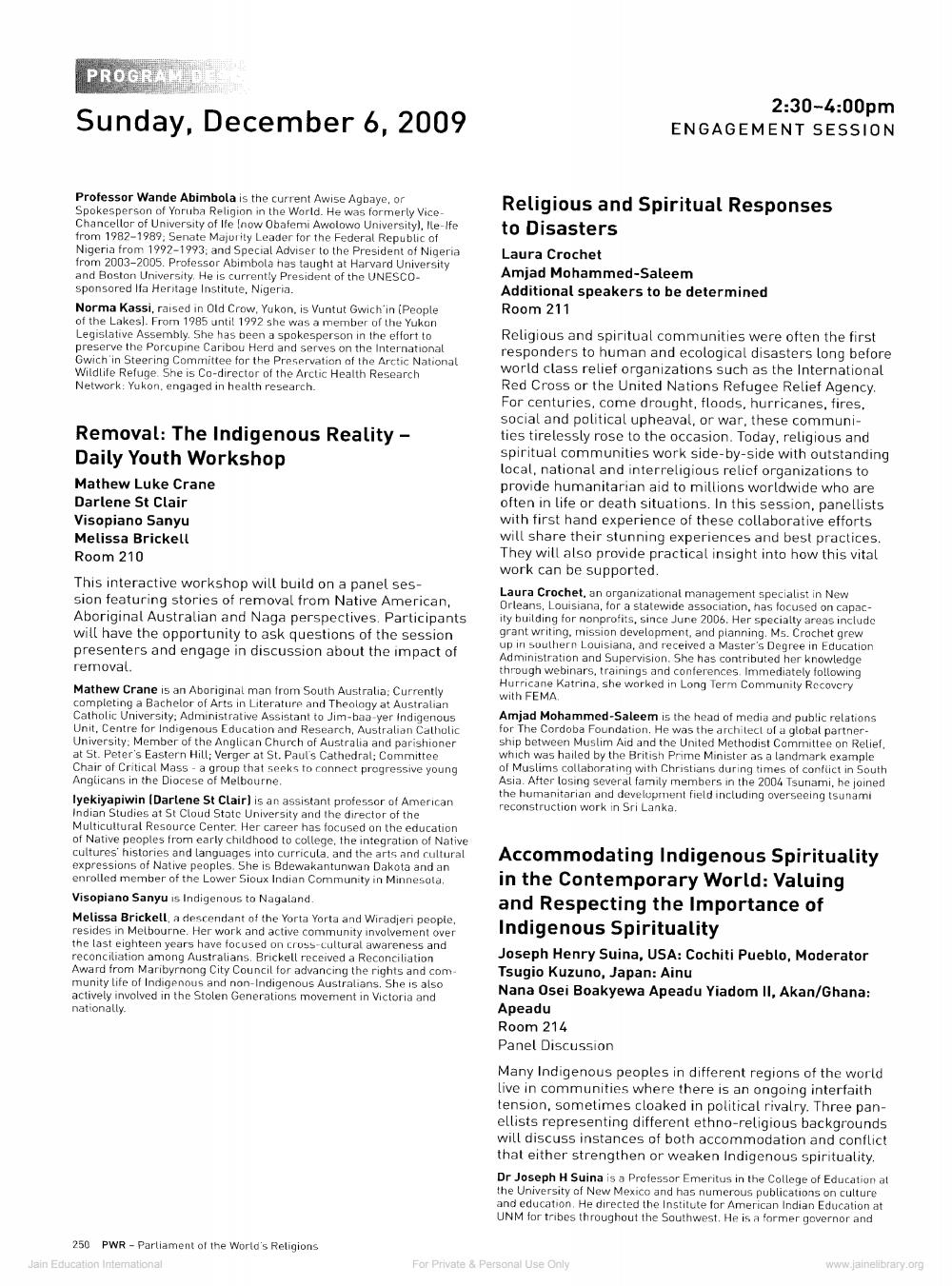________________
PROGRAM DES
Sunday, December 6, 2009
Professor Wande Abimbola is the current Awise Agbaye, or Spokesperson of Yoruba Religion in the World. He was formerly ViceChancellor of University of Ife [now Obafemi Awolowo University), Ile-Ife from 1982-1989; Senate Majority Leader for the Federal Republic of Nigeria from 1992-1993; and Special Adviser to the President of Nigeria from 2003-2005. Professor Abimbola has taught at Harvard University and Boston University. He is currently President of the UNESCOsponsored Ifa Heritage Institute, Nigeria.
Norma Kassi, raised in Old Crow, Yukon, is Vuntut Gwich'in (People of the Lakes). From 1985 until 1992 she was a member of the Yukon Legislative Assembly. She has been a spokesperson in the effort to preserve the Porcupine Caribou Herd and serves on the International Gwich'in Steering Committee for the Preservation of the Arctic National Wildlife Refuge. She is Co-director of the Arctic Health Research Network: Yukon, engaged in health research.
Removal: The Indigenous RealityDaily Youth Workshop
Mathew Luke Crane
Darlene St Clair
Visopiano Sanyu Melissa Brickell Room 210
This interactive workshop will build on a panel session featuring stories of removal from Native American, Aboriginal Australian and Naga perspectives. Participants will have the opportunity to ask questions of the session presenters and engage in discussion about the impact of removal.
Mathew Crane is an Aboriginal man from South Australia; Currently completing a Bachelor of Arts in Literature and Theology at Australian Catholic University; Administrative Assistant to Jim-baa-yer Indigenous Unit, Centre for Indigenous Education and Research, Australian Catholic University: Member of the Anglican Church of Australia and parishioner at St. Peter's Eastern Hill; Verger at St. Paul's Cathedral; Committee Chair of Critical Mass a group that seeks to connect progressive young Anglicans in the Diocese of Melbourne.
lyekiyapiwin (Darlene St Clair) is an assistant professor of American Indian Studies at St Cloud State University and the director of the Multicultural Resource Center. Her career has focused on the education of Native peoples from early childhood to college, the integration of Native cultures' histories and languages into curricula, and the arts and cultural expressions of Native peoples. She is Bdewakantunwan Dakota and an enrolled member of the Lower Sioux Indian Community in Minnesota, Visopiano Sanyu is Indigenous to Nagaland.
Melissa Brickell, a descendant of the Yorta Yorta and Wiradjeri people, resides in Melbourne. Her work and active community involvement over the last eighteen years have focused on cross-cultural awareness and reconciliation among Australians. Brickell received a Reconciliation Award from Maribyrnong City Council for advancing the rights and com munity life of Indigenous and non-Indigenous Australians. She is also. actively involved in the Stolen Generations movement in Victoria and nationally.
250 PWR- Parliament of the World's Religions Jain Education International
2:30-4:00pm ENGAGEMENT SESSION
Religious and Spiritual Responses
to Disasters
Laura Crochet
Amjad Mohammed-Saleem
Additional speakers to be determined Room 211
Religious and spiritual communities were often the first responders to human and ecological disasters long before world class relief organizations such as the International Red Cross or the United Nations Refugee Relief Agency. For centuries, come drought, floods, hurricanes, fires, social and political upheaval, or war, these communities tirelessly rose to the occasion. Today, religious and spiritual communities work side-by-side with outstanding local, national and interreligious relief organizations to provide humanitarian aid to millions worldwide who are often in life or death situations. In this session, panellists with first hand experience of these collaborative efforts will share their stunning experiences and best practices. They will also provide practical insight into how this vital work can be supported.
Laura Crochet, an organizational management specialist in New Orleans, Louisiana, for a statewide association, has focused on capacity building for nonprofits, since June 2006. Her specialty areas include grant writing, mission development, and planning. Ms. Crochet grew up in southern Louisiana, and received a Master's Degree in Education Administration and Supervision. She has contributed her knowledge through webinars, trainings and conferences. Immediately following Hurricane Katrina, she worked in Long Term Community Recovery with FEMA.
Amjad Mohammed-Saleem is the head of media and public relations for The Cordoba Foundation. He was the architect of a global partnership between Muslim Aid and the United Methodist Committee on Relief, which was hailed by the British Prime Minister as a landmark example of Muslims collaborating with Christians during times of conflict in South Asia. After losing several family members in the 2004 Tsunami, he joined the humanitarian and development field including overseeing tsunami reconstruction work in Sri Lanka.
Accommodating Indigenous Spirituality in the Contemporary World: Valuing and Respecting the Importance of Indigenous Spirituality
Joseph Henry Suina, USA: Cochiti Pueblo, Moderator Tsugio Kuzuno, Japan: Ainu
Nana Osei Boakyewa Apeadu Yiadom II, Akan/Ghana: Apeadu
Room 214
Panel Discussion
Many Indigenous peoples in different regions of the world live in communities where there is an ongoing interfaith tension, sometimes cloaked in political rivalry. Three panellists representing different ethno-religious backgrounds will discuss instances of both accommodation and conflict that either strengthen or weaken Indigenous spirituality.
Dr Joseph H Suina is a Professor Emeritus in the College of Education at the University of New Mexico and has numerous publications on culture and education. He directed the Institute for American Indian Education at UNM for tribes throughout the Southwest. He is a former governor and
For Private & Personal Use Only
www.jainelibrary.org




